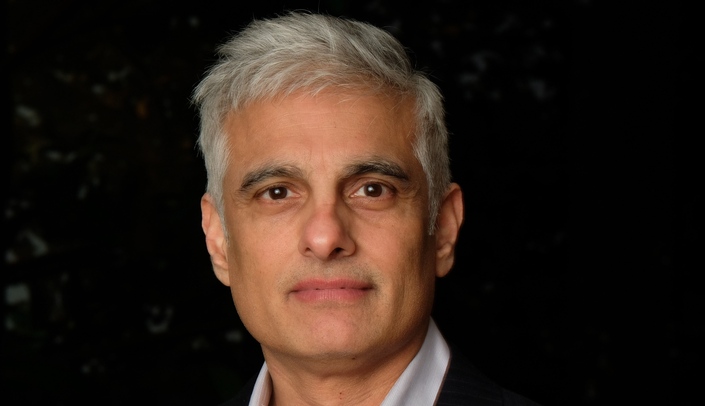Sunil Hingorani, MD, PhD, a highly accomplished and internationally recognized pancreas cancer researcher and clinician, has been named the inaugural recipient of the Nancy Armitage Pancreas Cancer Clinical Research Presidential Chair and the first director of the Pancreatic Cancer Center of Excellence at UNMC and Nebraska Medicine.
Dr. Hingorani, currently a professor and endowed research chair at Fred Hutchinson Cancer Research Center in Seattle, will begin at UNMC and Nebraska Medicine on May 1.
"We want to continue to excel among the world leaders in pancreas cancer research and treatment, and Dr. Hingorani is someone with proven results who can lead our team’s efforts," Chancellor Jeffrey P. Gold, MD, said. "Through our center of excellence and now with Dr. Hingorani, we will continue to discover new and better ways to prevent and earlier diagnose this terrible disease, and then provide patients with better treatment options. We will not stop until we have stopped pancreas cancer."
"The incidence of pancreatic cancer is on the rise, which drives the need for early identification and new treatment methods," Nebraska Medicine CEO Jim Linder, MD, said. "It is timely for Dr. Hingorani to be joining UNMC and Nebraska Medicine. Through his leadership, we expect him to expand the existing research and clinical programs. I could not be more delighted to welcome him to Nebraska."
Pancreas cancer is among the world’s most lethal cancers. Often discovered after it has spread to other organs, the five-year survival rate is 13% for those for whom the cancer has spread to nearby tissues or organs; that rate drops to 3% if the cancer has spread to distant parts of the body.
"This is a unique time in pancreas cancer research and clinical care as the field as a whole has developed a much deeper understanding of the many ways in which this disease evades our ability to detect and diagnose it, and of how it resists virtually every form of chemical and radiotherapy we throw at it," Dr. Hingorani said. "The timing could not be more perfect to capitalize on our new understanding of the disease through this extraordinary commitment and show of faith by the University of Nebraska, Nebraska Medicine, the state of Nebraska, the Fred & Pamela Buffett Cancer Center and numerous highly motivated individuals."
Dr. Hingorani said the goal of the new center will be to truly transform what is considered state-of-the-art in the early detection, diagnosis, chemoprevention and treatment of pancreas cancer.
"Coalescing the outstanding talent already present at UNMC and Nebraska Medicine, complemented by additional recruits as necessary, around a new facility together with sufficient resources, should enable us to succeed," Dr. Hingorani said. "I am deeply honored to be named to this prestigious chair in remembrance of Nancy Armitage and to be able to work with such gifted and committed colleagues in this endeavor."
Dr. Hingorani will spend most of his time at UNMC conducting and overseeing a comprehensive translational research program, but also will lead the development of a real-time, multi-disciplinary clinic for pancreas cancer patients at Nebraska Medicine. There, he will collaborate with specialists in medical oncology, surgical oncology, radiation oncology, transplant surgery, nursing, pathology, radiology, nutrition, physical therapy, social services, spiritual services and several other areas to provide comprehensive care to pancreas cancer patients.
"Dr. Hingorani is an exceptional translational scientist in the area of pancreatic cancer research and will be responsible for building not only his own research program, but also forming a team of scientists, clinicians and a translational team of experts in pancreatic cancer research and care. We are excited to have him leading this important area," said Julie M. Vose, MD, Harris Professor and chief of the UNMC Division of Hematology/Oncology.
Dr. Hingorani’s research success is well-documented. He helped develop the first mouse models to accurately mimic human pancreas cancer from its precancerous inception to its advanced stages. Dr. Hingorani has used these models to identify genetic events, signaling pathways and collaborating cell types that contribute to the aggressiveness of ductal adenocarcinoma, the most common and deadly form of pancreas cancer. Dr. Hingorani has made multiple breakthroughs in his lab that have informed the course of his latest phase of research, as well as that of others, and his lab is testing these ideas in a novel Murine Clinical Trials Program to identify those strategies most likely to succeed in patients.
Dr. Hingorani will build upon a team at UNMC that already receives more than $8.5 million in annual funding from the National Cancer Institute, including a prestigious Specialized Program of Research Excellence (SPORE) grant.
"Through a team science effort, led by Dr. Hingorani and others, the Pancreatic Cancer Research Center of Excellence will conduct cutting-edge research in the lab and ultimately bring new therapies, treatments and early pancreatic screening techniques to the patient," said Ken Cowan, MD, PhD, director and physician-in-chief of the Fred & Pamela Buffett Cancer Center. "Dr. Hingorani’s expertise and experience will perfectly complement the work of physicians and scientists here at UNMC. Ultimately, this collaboration and symbiosis will provide immense benefit to our patients."


Welcome, Dr. Hingorani. We can’t wait to have you on the UNMC/NM team.